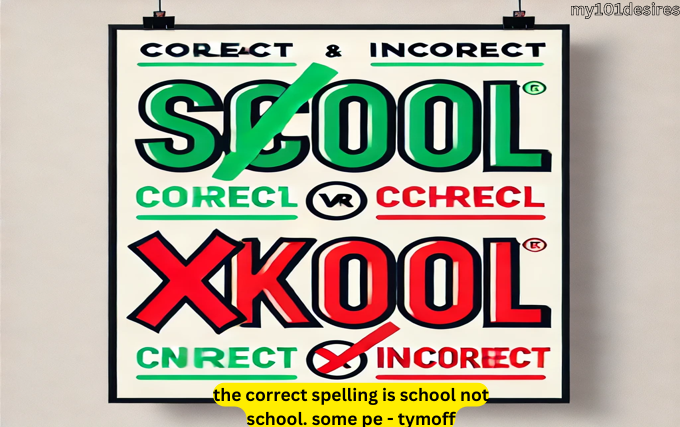In a world where digital communication dominates, spelling errors have become increasingly common. While many mistakes are harmless, some can lead to confusion, especially in educational settings. One of the most frequently misspelled words is “school.” Surprisingly, “skool” is a misspelling that often pops up in informal writing and online communication. In this article, we’ll explore why “the correct spelling is school, not skool,” and how such errors can impact our daily lives, especially in education. We’ll also touch on why some people might make these mistakes and how to avoid them.
Why ‘School’ Is the Correct Spelling
The Origin of the Word ‘School’
The word “school” has its roots in ancient languages. It comes from the Greek word “scholē,” which originally meant “leisure” or “free time.” Over time, the meaning evolved to refer to a place where students gather to learn during their free time. This word was later adopted by the Romans and eventually made its way into English. The correct spelling, “school,” has been standardized over centuries, making it universally recognized.
The Misconception Behind ‘Skool’
The misspelling “skool” often arises from phonetic spelling, where words are spelled the way they sound. English, however, is notorious for having words that are not spelled phonetically, and “school” is one of them. The letters “ch” in “school” produce a hard “k” sound, which can confuse those unfamiliar with the word’s etymology. As a result, some people might incorrectly spell it as “skool.”
The Importance of Correct Spelling in Education
Impact on Students
In educational environments, spelling accuracy is crucial. Teachers emphasize correct spelling to help students communicate effectively and understand the nuances of the English language. Spelling “school” correctly is not just about following rules; it’s about respecting the language’s history and structure. Incorrect spelling, such as writing “skool,” can lead to misunderstandings and might even affect a student’s academic performance.
Influence on Communication
Beyond the classroom, correct spelling is essential in all forms of communication. Whether you’re writing an email, a report, or a social media post, spelling errors can undermine your credibility. The phrase “the correct spelling is school, not skool. some pe – tymoff” highlights the importance of using accurate language, especially in professional or formal settings.
Common Reasons for Spelling Mistakes
Phonetic Spelling Tendencies
As mentioned earlier, one of the primary reasons people spell “school” as “skool” is due to phonetic spelling. English speakers might rely on how a word sounds rather than its correct spelling, leading to errors. This issue is particularly common among younger students or non-native speakers who are still learning the intricacies of the language.
Typing Errors and Autocorrect
In the digital age, typing errors are also a significant factor. People often type quickly, leading to mistakes like “skool” instead of “school.” Additionally, autocorrect features on smartphones and computers might not always catch these errors, especially if “skool” has been added to a device’s dictionary by mistake.
Informal Language in Digital Communication
The rise of informal language in texting and online communication has also contributed to the prevalence of spelling errors. Slang and abbreviations are common, and some users may deliberately alter spellings to appear trendy or casual. While this might be acceptable in informal contexts, it can create bad habits that spill over into formal writing.
How to Avoid Common Spelling Mistakes
Practice and Familiarity
The best way to avoid spelling mistakes is through practice and familiarity with the language. Regular reading and writing help reinforce correct spelling, making it easier to remember how words like “school” are spelled. Teachers and parents can play a crucial role by encouraging reading and correcting errors when they occur.
Utilizing Spell Check Tools
Spell check tools available in word processors and online platforms are invaluable for catching mistakes. However, it’s important not to rely solely on these tools, as they might not catch every error, especially if the incorrect word is still a valid word (e.g., “skool” might be overlooked if added to the dictionary). Always double-check your work.
Understanding the Root of Words
Learning about the origins of words can also help improve spelling. Knowing that “school” comes from the Greek word “scholē” might make it easier to remember the correct spelling. This approach can be particularly helpful for students and language learners who struggle with English spelling.
Conclusion
Spelling errors like “skool” instead of “school” might seem minor, but they can have significant implications, especially in educational and professional settings. Understanding why “the correct spelling is school, not skool” and being aware of common mistakes can help individuals communicate more effectively. By practicing proper spelling, using available tools, and understanding the roots of words, anyone can improve their spelling skills and avoid common pitfalls.
Incorporating the keyword “the correct spelling is school not school. some pe – tymoff” into your daily practice will remind you of the importance of accurate spelling. Whether you’re a student, a teacher, or a professional, mastering correct spelling is a valuable skill that enhances your communication and credibility.
